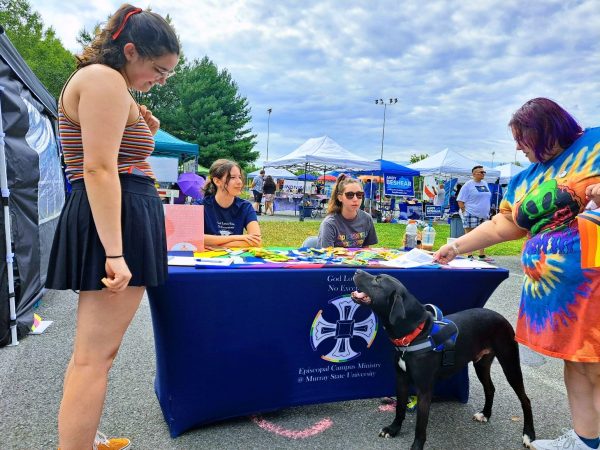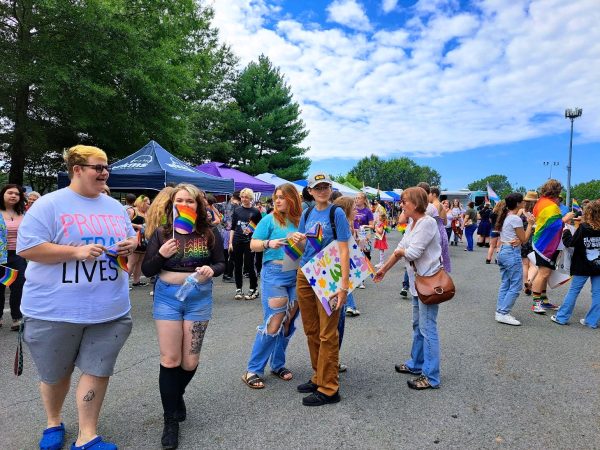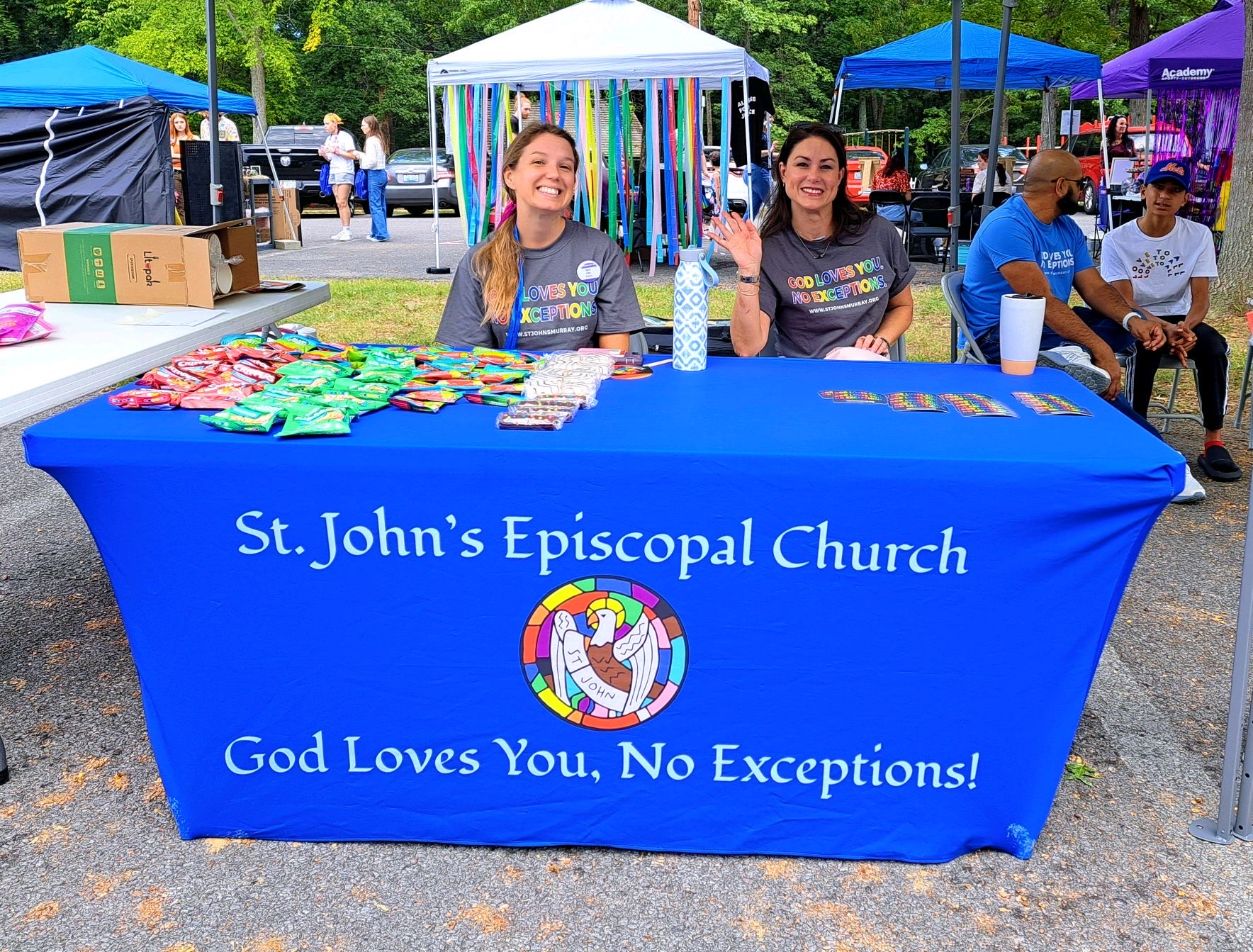Brittany Sutherland spends most of her time listening to other people’s stories.
The pastor at Murray’s First Presbyterian Church, Sutherland says many of the stories she hears share a pattern, one of pain and rejection caused by treatment in the church. This pattern is especially common in the stories of LGBTQIA+ (Queer) people, which motivates Sutherland to make sure the church is visible at Pride.
“These events give us an opportunity to put love into the world,” Sutherland said. “And maybe our presence can start to heal just a tiny bit of the hurt that has been caused for far too long.”
Murray celebrated its Queer community with a Pride March mid-September to the annual Pride at the Park where local organizations set up booths at Central Park to show their support. Sutherland’s church was one of two in attendance.
The divide Sutherland sees between the Queer community and the Christian church is a problem present across the country. While over half (51%) of Queer adults identify with a religious affiliation, the majority do not feel completely welcome in the church, according to the Pew Research Institute. For Queer Christians of the Protestant denomination, which would include Presbyterian churches like Sutherland’s, 47% reported feeling a conflict between their Queer identity and religious beliefs, accredited to the public disapproving stance on homosexuality taken by many evangelical churches.
For affirming churches hoping to reach this rejected demographic, they face a difficult challenge: How do you help Queer Christians once again feel welcome in church communities?
“I’ve met people who have been hurt so deeply and abused by churches that I don’t know how they would ever go back. I really don’t,” said Angie Mills, who has been a member of Murray’s St. John’s Episcopal Church for 17 years. “So I think that what St. John’s needs to do is meet people where they are.”
For Mills, who is heavily involved with St. John’s outreach ministries, offering a safe and welcoming environment is key when trying to reach Queer people who feel rejected by the church. Mills said that even if people don’t come to her church on Sunday, as long as they know that there is a safe church space where they could attend, she knows St. John’s is having the impact it needs to have.
“Several months ago, I met a new person who came into St. John’s, and I thought I’d met her before, but I wasn’t sure,” Mills said. “And I said, ‘Well, you look really familiar to me. Have we met before?’ And she said, ‘No, but I know who you are. Because people tell me that you’re the church mom, and it’s okay to come to church here…’ I would never ask you to come inside a church if you didn’t want to. But if you did, you could come in with me.”
Churches have to respect the trauma people may have associated with religion and be understanding of the complex relationships some people navigate when they step into a church, Mills said. To reach people who may not feel safe entering a church building, she believes their church has to be visible outside of Sunday mornings, which is part of why she worked so hard to organize St. John’s participation in Pride.
“I have never been in a space where people feel so accepted and so loved. I think that’s actually palpable in the air,” Mills said about her time volunteering at Pride.

Mills ordered T-shirts for St. John’s volunteers to wear. The shirts bore a message that is central to St. John’s inclusive stance: God loves you. No exceptions.
When people at Pride saw the shirts, many people were overjoyed and shared their stories with Mills.
“I get a lot of stories about how they wish their mom was at Pride, or they wish people from their church were at Pride,” Mills said. “I usually have something on that says ‘free mom hugs.’ And I’m always surprised at the people that take me up on that, that don’t even know me. I didn’t realize how easy it could be just for me as a mom just to be there, and to listen to people and then give them hugs when they need them.”
Churches that take affirming stances don’t do so without pushback, said Sydney Littrell, the vice president of St. John’s Episcopal Campus Ministries (ECM) who attended her first Pride while representing ECM. Openly welcoming Queer people into your church can lead to isolation.
“Sometimes non-affirming Christians criticize us or avoid partnering with our ministries because they don’t support our affirming stance,” Littrell said. “Christians as a whole aren’t cohesive when it comes to this topic… many Christians hold ‘accepting not affirming,’ ‘hate the sin, not the sinner,’ or ‘just don’t live that lifestyle’ attitudes towards LGBT+ people.”
While most churches in the Murray area aren’t openly affirming, Littrell said she believes the consequences of welcoming Queer people are more than worth it; the visibility can help people outside of the church see that the doors of religion are open to them.
“One man at Pride told me that there aren’t any affirming churches in his town, so he and his husband have to drive a town over to attend the church where they were married,” Littrell said. “Seeing St. John’s, ECM, and 1st Pres at Pride can make a big difference in helping both LGBT+ and ally attendees understand that there are Christians who want to support them.”
This resolve is a common pillar for affirming churches.
“Not everyone will agree, not everyone will understand, and some will choose to leave the church, but we must always try to do the work of loving our community,” Sutherland said.
For affirming churches like St. John’s and Murray’s First Presbyterian Church, the core of their motivation lies in welcoming those outside of their congregations, regardless of the judgment they may face from other Christians.
“I don’t think that God only resides inside the walls of a church,” Mills said. “And what St. John’s is supposed to be doing is not for the people that are sitting next to us in the pews. It’s for the people that are outside of our walls.”
For those interested in attending an affirming church in Murray, the First Presbyterian Church holds its Sunday worship services at 10:45 a.m. at 1601 Main St. and St. John’s Episcopal Church holds its Sunday services at 10:30 a.m. at 1620 Main St.










